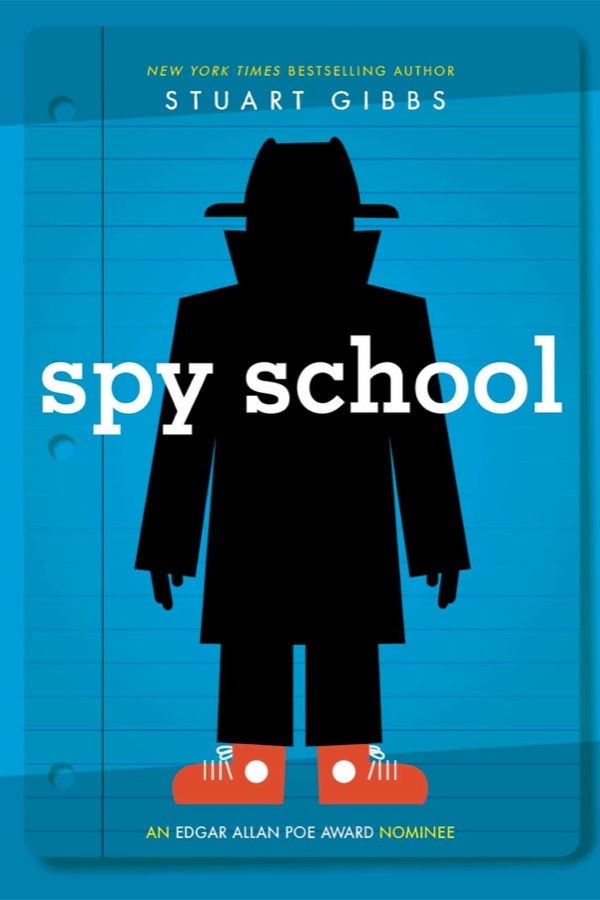In the Spy School series, Stuart Gibbs has delivered five hilarious if unashamedly mindless page turners. In a landscape of children’s literature where content sometimes ranges from the heavy-handed and political on one end, to the highly problematic and totally vapid on the other, Spy School occupies the “middle ground” of cheerful amorality, with comparatively little immorality. The books are consistently entertaining, and (mostly) harmless, though they lack any kind of formational value[1].
The series follows the career of one Ben Ripley, a spy in training whose adventures take on increasing weight and national importance as the series progresses. Ben is your typical middle-school lit protagonist, an every-youth with some obvious weaknesses, and a few hidden strengths. He’s also a wisecracking observer of the world, yet one who is oblivious to just the sort of things to which middle schoolers are typically oblivious. Naturally there’s a strong female character, Erica, who, though a teenage girl, knows martial arts well enough to easily incapacitate grown men with military training. A cast of other standard personality types assists Ben as he finds himself in one harrowing situation after another, always managing to solve the enemy’s plans at the last second. The author throws in many twists, and plenty of intrigue, all in smooth and simple prose that will have young readers flipping through pages like thumbs on smartphones.
None of that is by way of criticism; the books make no pretense of being anything other than tasty candy bars. Still, Gibbs sometimes goes beyond entertainment into mild sketchiness. Several girls are described as “hot,” when “beautiful” would have been more appropriate from a hero’s mouth. On another occasion, a villain is seemingly snapping pictures of girls on the beach (though his behavior is called perverted), and there are several other throwaway comments of a PG-13 nature. The book is aimed at middle schoolers, and this might be common middle school talk, but it detracts a bit from the characters. The protagonist Ben Ripley would have been a deeper and more human character if his feelings for Erica had more in the nature of tenderness. Gibbs chooses to dodge most deep and noble feelings, perhaps because they’re too heavy for a series that is all about fun. Luckily, he also steers clear of anything too problematic in the girl and boy department, but the books’ take on honesty is a different matter.
As is the case with far too many contemporary young adult novels, there’s a lot of lying in these books. Sometimes these are lies of convenience, and sometimes lies of “necessity,” but whatever the reasons, characters lie frequently and with apparent ease. Of course some lies are frowned on — lies uttered by bad characters for bad reasons — but generally, lies are just what characters do when they want to conceal the truth. You apparently only have to tell the truth to people to whom you want to tell the truth, at least that’s the way the rules seem to work in Gibbsville. Alas, one can hardly peruse any juvenile fiction without seeing this trend.
Apart from these concerns, which are “mild” because they are just so typical of books for this audience, the Spy School series seems fairly harmless. One thing is undeniable: they’re funny. Any series of juvenile books that can make an adult reviewer repeatedly laugh out loud, despite himself, can’t be all bad. Though the books aren’t meant to be taken too seriously, it would be nice if they hadn’t shown a skewed attitude toward truth in speech, and if they’d drawn more attention to the nobility of love. Flawed in certain ways, the Spy School books are still acceptable reading for most well-formed children in their intended age range.
Discussion Questions
- Ben likes Erica, but Zoe really likes Ben. Of the two young women, which one seems to have a truer, purer heart?
- How do you feel about the way Cyrus treats Alexander? Is it just or unjust?
- Recognizing that Alexander has free will, how much of a role do you think Cyrus’s behavior played in Alexander’s poorer career decisions?
- Cyrus and Erica are all business, even to the point of sacrificing all friendships, and sometimes behaving rather inhumanly toward family members. Does the safety of society really require there be certain individuals who are cold-hearted “for the greater good”?
- The fifth book jokes around about government torture, while not saying directly what it means by the term. Is it morally permissible to torture enemies “for the greater good”?
[1] These books seem to have a much lighter tone, and far less violence, than the Alex Rider series, elsewhere reviewed on the Forum. Still, light-hearted references to government-sanctioned torture (the fifth book’s term for it), and various other references to offings and assassinations that go with the job (without being shown), could be seen as normalizing or sanctioning such acts.



